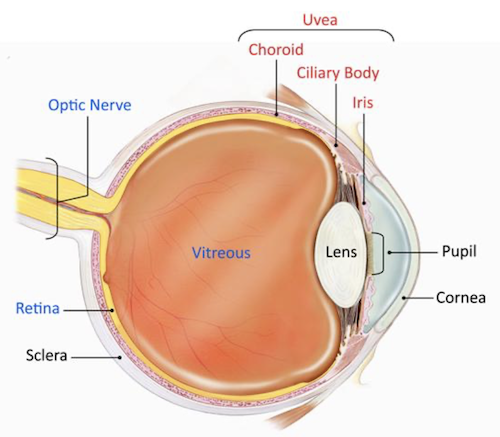Prevent Blindness has declared September 16–22, 2024, as Inflammatory Eye Disease Awareness Week. There are several inflammatory eye conditions. The one we specialize in at Texas Retina is called uveitis [u-vee-i-tis].
Understanding Uveitis
In uveitis, the body’s immune system attacks the eye. It can occur in one eye or both eyes and affects the middle layer of the eye called the uvea [u-vee-uh]. It also can be associated with inflammation of other parts of the eye. Uveitis is classified by its location. Various types include scleritis, iritis (iridocyclitis), pars planitis (intermediate uveitis), posterior uveitis, and panuveitis.
A rare condition, uveitis can be acute and last for only a short time, or it can be chronic, requiring ongoing monitoring and treatment. Early detection and treatment are important.
Treating Uveitis
Left untreated, uveitis can lead to permanent vision loss, retinal damage, cataracts, and glaucoma. Each patient’s treatment must be customized to control the level of inflammation and reduce possible side effects. Treatments can include corticosteroid eye drop medications that reduce inflammation, dilating eye drops to help reduce pain and swelling, eye injections, and oral medication.
Specialized Care for Uveitis at Texas Retina
There are only around 40 combined retina/uveitis specialists in the entire U.S. At Texas Retina, we are fortunate to have two physicians who are fellowship-trained in both and sub-specialize in diagnosing and caring for patients with this rare, complex condition: Robert C. Wang, MD, and Rene Y. Choi, MD.
Dr. Wang completed his uveitis training at the University of Southern California Doheny Eye Institute and his retina training at Harvard University Massachusetts Eye and Ear Infirmary. He cares for uveitis patients in our Dallas Main, Dallas North, Plano and Sherman offices.
Dr. Choi completed a clinical uveitis fellowship at Devers Eye Institute in Portland, Oregon, as well as a uveitis and clinical ocular immunology fellowship at Casey Eye Institute, Oregon Health & Science University, where he also completed his retina training. He cares for uveitis patients in our Denton and Frisco offices.
Leading Research on New Uveitis Treatments
In addition to their experience diagnosing and treating uveitis, both Dr. Wang and Dr. Choi are actively involved in conducting clinical research and are on the forefront of investigating better uveitis treatments. In fact, Dr. Choi recently initiated a study called TYNI that is investigating the safety and efficacy of a higher dose of YUTIQ (fluocinolone acetonide intravitreal implant) than what is currently used to treat patients with chronic, difficult-to-treat non-infectious uveitis affecting the posterior segment.
Additional uveitis clinical trials currently available at Texas Retina include the following:
- Clarity — Led by Dr. Wang, this is a Phase III study to investigate oral brepocitinib in adults with active, non-infectious intermediate-, posterior-, and panuveitis.
- Leopard — Also led by Dr. Wang, this study is evaluating the efficacy and safety of dexamethasone ophthalmic suspension eye drops in uveitic and post-surgical macular edema.
- Meerkat GR44277 — Led by Dr. Choi, this Phase III, multicenter, randomized, double-masked, sham-controlled study is investigating the efficacy, safety, pharmacokinetics and pharmacodynamics of RO7200220 administered intravitreally in patients with uveitic macular edema.
Click here to learn more about all of Texas Retina’s current clinical trials.
To learn more about uveitis, including the various types, risk factors, symptoms, and treatments, click here.


